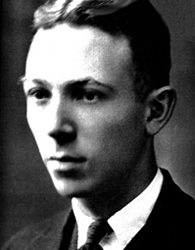Revered by children for books such as “Charlotte’s Web” and “Stuart Little,” renowned among writers for the invaluable Strunk & White’s “The Elements of Style” and considered a paragon among New Yorkers for his love of the city, E.B. White’s erudition and observation continue to inspire, inform and entertain new generations.
E.B. White’s Early Days
Elwyn Brooks White was born on July 11, 1899, in Mount Vernon, New York. Though his father owned a piano manufacturing company and there were always musical instruments around, Elwyn and his five siblings didn’t seem to have any musical talent. Instead, White showed an early penchant for writing. He published his first story, “A Winter Walk,” in a magazine for young readers when he was 12 years old, according to the Greenville Public Library.
White attended Cornell University, where he acquired the nickname “Andy.” After graduation, he moved to New York and went through a series of unsatisfactory jobs in news, public relations and advertising, including a brief stint in Seattle.
In 1925, he returned to New York and had his first piece, “Defense of the Bronx River,” published in The New Yorker magazine, formally launching his illustrious writing career and long association with the magazine. He also met Katharine Sergeant Angell, an editor at the magazine, and married her a few years later.
Sources in this Story
- Greenville Public Library: Juvenile Books Author of the Month: E.B. White
- BookRags: (Encyclopedia of World Biography): E. B. White Biography
- The New York Times: E.B. White, Essayist and Stylist, Dies
- HarperCollins Children’s Books: A Letter from E. B. White
- NPR: Strunk And White’s Venerable Writing Guide Is 50
- The Chronicle of Higher Education: 50 Years of Stupid Grammar Advice
- The New Yorker: Andy
- The New York Times: Life & Times: E.B. White
White’s Literary Accomplishments
White was made a contributing editor at The New Yorker in 1927, an arrangement that lasted the rest of his life. “His comments, pieces and poems in The New Yorker helped to set the tone of sophisticated wit, irreverence and necessary candor almost since the magazine’s beginnings in the 1920’s,” wrote The New York Times’ Herbert Mitgang.
He moved to a farm in North Brooklin, Maine, in the late ‘30s, and remained there for most of his life. He retained a fondness for New York, however; in 1948, during a summer visit to the city, he penned “Here Is New York,” the “quintessential love letter to the city.”
White also wrote children’s fiction, publishing “Stuart Little” in 1945, “Charlotte’s Web,” which was inspired by the animals on his farm, in 1952, and “The Trumpet of the Swan” in 1970. Shortly before his death in 1985, White released a letter to his young readers.
“Are my stories true, you ask? No, they are imaginary tales, containing fantastic characters and events,” he wrote. “But real life is only one kind of life—there is also the life of the imagination. And although my stories are imaginary, I like to think that there is some truth in them, too—truth about the way people and animals feel and think and act.”
White is known to many writers as the co-author of “The Elements of Style,” a guide to writing originally published by his old Cornell professor, William Strunk. White revised the pamphlet, which he described as Strunk’s “attempt to cut the vast tangle of English rhetoric down to size and write its rules and principles on the head of a pin.”
White’s revision, published in 1959, has gone on to sell more than 10 million copies and become a staple of high school and college writing classes. While many writers swear by “Strunk & White,” some language experts have condemned it for its esoteric and sometimes incorrect grammatical advice.
White earned numerous accolades and awards during his lifetime, beginning with the Gold Medal for Essays and Criticism from the National Institute of Arts and Letters in 1960. In 1963, he was a recipient of the Presidential Medal of Freedom and received the National Medal for Literature in 1971. In 1973, he was elected to the American Academy of Arts and Letters and was awarded a Pulitzer Prize Committee special citation for his body of work in 1978.
E.B. White’s Work
- “Charlotte’s Web”
- “Stuart Little”
- “The Trumpet of the Swan”
- “Here is New York”
- “The Elements of Style Illustrated”
The Rest of the Story
White died of Alzheimer’s disease in Maine on October 1, 1985. William Shawn, the editor of The New Yorker, remarked, “E.B. White was a great essayist, a supreme stylist. His literary style was as pure as any in our language. It was singular, colloquial, clear, unforced, thoroughly American and utterly beautiful.”
Roger Angell, the renowned editor and baseball writer for The New Yorker, was also White’s stepson. He wrote a poignant encomium to “Andy” in The New Yorker in 2005.
Listen to a rare recording of White reading a passage from “Charlotte’s Web,” along with other illuminating interviews, including one about his beloved wife after her death, courtesy of The New York Times.
Read a 1969 interview White gave to the Paris Review.











